IMF Seminar: Debate on the Global Economy

IMF SEMINAR EVENT
DATE: April 21, 2022
DAY: Thursday
1:00 PM - 2:00 PM
LOCATION: Virtual
Overview
The war in Ukraine comes at a time when some countries are moving past the acute phase of the pandemic and the global economy is just recovering—although COVID-19 deaths remain high, and cases are growing again in many regions. As central banks fight persistent and widespread inflation, rising debt vulnerabilities, multilateral efforts to respond to the humanitarian crisis and end the pandemic remain essential. Join this debate on the global economic outlook.Join the conversation via #GlobalEcon
IMF Seminar: Debate on the Global Economy
Event Summary
The war in Ukraine comes at a time when the world is confronted with challenges including the pandemic and rising inflationary pressures. Multilateral efforts are more important than ever to address these challenges and foster a stronger, greener, and more inclusive global recovery.
Key Points:
- Multiple headwinds. Panelists stressed that the world is grappling with multiple shocks including the war in Ukraine, high inflation, food and energy insecurity, high debt levels, and climate change. Georgieva noted that the IMF’s further possible downward revision of the global growth forecast depends on the war’s duration and the effectiveness of policies to deal with inflation without slowing down economic growth. Lagarde noted that the war has not only led to devastation and a refugee crisis in Europe but has also caused ripple effects globally. With U.S. inflation beyond the Federal Reserve’s 2-percent target, Powell emphasized the need to establish price stability and noted that it is appropriate to move a little more quickly to remove monetary accommodation. Indrawati noted that the U.S. monetary policy tightening and COVID lockdowns in a few Chinese cities will exert a huge impact on many emerging markets and developing countries, adding pressure on their nascent recovery from the pandemic. Noting that its debt vulnerabilities have risen since the onset of the pandemic, Mottley highlighted that Barbados does not have the same fiscal and monetary policy accommodation cushion as the advanced economies.
- Globalization. Powell noted that it is unclear if the world is witnessing a reversal of globalization, but the pace of globalization is certainly slowing down. Georgieva argued that it is too early to “buy a coffin” for globalization. The world has achieved so much because of the integrated global economy, and it is irresponsible to make the world poorer.
- International coordination. Panelists concurred that international cooperation at this juncture is more critical than ever. One of the objectives of the IMF and World Bank Spring Meetings, highlighted Georgieva, is to provide a platform for policymakers to deliberate and identify the optimal policy mix to address short-term challenges without jeopardizing long-term sustainable growth. The newly-established Resilience and Sustainability Trust will provide long-term concessional financing for many low- and middle-income countries. Mottley called for non-Paris Club creditors and the private sector to further contribute to resolving countries’ debt vulnerabilities. Indrawati stressed that preserving global cooperation is one of the most important global assets.
Quotes:
“We do live in a more shock-prone world. If anything, we have learned in these two years, that we have to be more agile and resilient to these shocks.” Kristalina Georgieva
“All wars are horrible, and this one is no different.” Christine Lagarde
Panelists
Panelist: Kristalina Georgieva
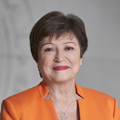 Kristalina Georgieva is the Managing Director of the International Monetary Fund (IMF). She is the first person from an emerging market economy to lead the IMF since its inception in 1944. Before joining the Fund, Ms. Georgieva was Chief Executive Officer of the World Bank and also served as Interim President for a time. Previously, she served at the European Commission as Vice President for Budget and Human Resources – and as Commissioner for International Cooperation, Humanitarian Aid and Crisis Response. She was named “European of the Year” and “Commissioner of the Year” by European Voice for her leadership in the European Union’s humanitarian response to crises.
Kristalina Georgieva is the Managing Director of the International Monetary Fund (IMF). She is the first person from an emerging market economy to lead the IMF since its inception in 1944. Before joining the Fund, Ms. Georgieva was Chief Executive Officer of the World Bank and also served as Interim President for a time. Previously, she served at the European Commission as Vice President for Budget and Human Resources – and as Commissioner for International Cooperation, Humanitarian Aid and Crisis Response. She was named “European of the Year” and “Commissioner of the Year” by European Voice for her leadership in the European Union’s humanitarian response to crises.
Panelist: Mia Mottley
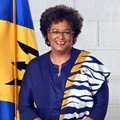
The Honourable Mia Mottley is the 8th Prime Minister of Barbados. She became the first woman to occupy the high office, following General Elections on May 24th 2018, in which she led the Barbados Labour Party to an emphatic victory, winning all 30 seats in the House of Assembly by the largest margin ever seen in the electoral history of the country.
An Attorney-at-Law and Queen’s Counsel, Prime Minister Mottley has been active in the political life of Barbados for almost three decades. First elected in 1994 she is presently serving her sixth term as Member of Parliament for the constituency of St. Michael North East.
Between 1994 and 2008 Miss Mottley served in the Cabinet of three successive Administrations, first as Minister of Education and Culture; then as Attorney-General and Minister of Home Affairs; and then as Minister of Economic Affairs. In 2003 she was appointed Deputy Prime Minister.
Prime Minister Mottley currently also holds the portfolios of Minister of Finance, Economic Affairs and Investment.
Since becoming Prime Minister, Miss Mottley has served as the Chair of the Conference of Heads of Government of the Caribbean Community (CARICOM) between January 1st and June 30th, 2020. Notwithstanding that, Miss Mottley, as Prime Minister of Barbados, serves as the Lead Head of Government within CARICOM, bearing responsibility for the CARICOM Single Market and Economy (CSME).
Prime Minister Mottley also serves as Co-Chair of the Americas Cruise Tourism Task Force for the Caribbean, Mexico, Central and South America markets.
Prime Minister Mottley is also Co-Chair of the Development Committee (DC) of the World Bank and the International Monetary Fund (November 2020 to October 2021). Prime Minister Mottley is also Co-Chair of the World Health Organization’s Global Leaders Group on Antimicrobial Resistance.
Panelist: Christine Lagarde
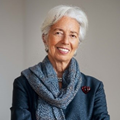
Since November 2019, Christine Lagarde has been the President of the European Central Bank. Between 2011 and 2019, she served as the eleventh Managing Director of the International Monetary Fund (IMF). Prior to that, she served as the French Economic Finance Minister from 2007 to 2011 after having been the Trade Secretary from 2005 to 2007. A lawyer by background, she practiced for 20 years with the international law firm Baker McKenzie, of which she became global chairperson in 1999. She was the first woman to serve in all of these positions.
In 2020, Lagarde was ranked the second most influential woman in the world by Forbes and has been named by TIME as one of the 100 most influential people in the world. Christine Lagarde was named Officier in the Légion d'honneur in April 2012 and Commandeur dans l’ordre national du mérite in May 2021.
Panelist: Sri Mulyani Indrawati
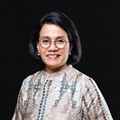
Sri Mulyani Indrawati has served as Finance Minister of Indonesia since 2016. She served in the same post from 2005 to 2010. From 2010–2016, she served as the Managing Director of the World Bank Group. From 2002–2004, she was an Executive Director at the Executive Board of the International Monetary Fund, representing 12 economies in Southeast Asia. She has been honored globally with awards such as the World's Best Minister at the World Government Summit in 2018 and the Distinguished Leadership and Service Award from The Institute of International Finance in 2021. In December 2023, the Australian National University awarded her an honorary Doctor of Laws, recognizing her substantial impact on economic development at both the national and international levels. She obtained her bachelor’s degree in economics from the University of Indonesia in 1986, she advanced her studies in the United States at the University of Illinois at Urbana-Champaign in 1992, earning a Master of Science in Policy Economics in 1990 and a Ph.D. in Economics in 1992.
Panelist: Jerome Powell
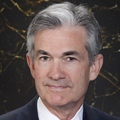
Jerome H. Powell took office as Chair of the Board of Governors of the Federal Reserve System on February 5, 2018, for a four-year term. He was renominated that position by President Biden in November 2021. Mr. Powell also serves as Chairman of the Federal Open Market Committee. Mr. Powell has served as a member of the Board of Governors since taking office on May 25, 2012. He was reappointed to the Board and sworn in on June 16, 2014, for a term ending January 31, 2028.
Prior to his appointment to the Board, Mr. Powell was a visiting scholar at the Bipartisan Policy Center in Washington, D.C. He has also served as An Assistant Secretary and Under Secretary of the U.S. Department of the Treasury.
He received an AB in politics from Princeton University and a law degree from Georgetown University.
Moderator: Sara Eisen

Sara Eisen is anchor of CNBC’s “Closing Bell” (M-F, 3PM-4PM ET). She is known for her deep expertise in financial markets and the global economy as well as regular news making interviews with some of the most prominent names in the financial world.
She joined CNBC in December 2013 as a correspondent, focusing on the global consumer.
She is the editor of “Currencies After the Crash: The Uncertain Future of the Global Paper-Based Currency System” published by McGraw-Hill in Jan. 2013.
Eisen holds a master’s degree in broadcast journalism with a concentration in business reporting from the Medill School of Journalism at Northwestern University.







